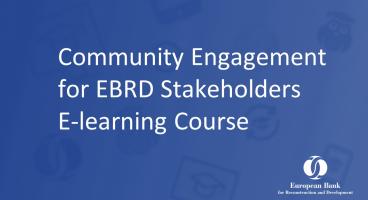Welcome to the "Community Engagement for EBRD Stakeholders " E-learning Course.
This course has been created in collaboration between the European Bank for Reconstruction and Development (EBRD) and Audire Consultants, UK.
This course provides accessible and engaging material to train community-facing personnel (including those of contractors) and all project staff whose work relates in some way to community engagement and the insights gained from it (e.g. project managers). The aim is to encourage trainees to think differently about their own work and the context within which they work. Exercises and tests are aimed at critical thinking and problem-solving capabilities. Suggested team exercises are a key feature of the course: bringing community-facing teams together for training is an important team-building opportunity for people who often work remotely.
To provide diversity in the learning experience, we have provided a range of different types of material throughout the course. The content can also be used in different training modes: face-to-face, hybrid, ‘tutored’ and self-directed experiences. Course participants can choose to access the course from a computer or a smart phone.
A Technical Guide for all course users can be found here.
A Course Guide for team leaders can be found here.
- Languages: English, Turkish & Georgian (coming soon!)
- Time to complete: approx. 4 hours
- 100% online: start instantly and learn at your own speed
- 4 modules, 36+ resources and reading materials, 6 case studies, 12 quizzes, 1 final test
- Certification by EBRD
Course Curriculum
Module One: Projects, People and Principles
The Learner will:
LO1: Understand why community engagement matters.
LO2: Explore the concepts of ‘community’ and ‘affected communities’.
LO3: Explore the meaning of good engagement.
LO4: Understand the links between community engagement, the EBRD’s Environmental and Social Performance Requirements and other international standards.
LO5: Understand the importance of adapting these requirements to local realities.
Module Two: Getting Started
The Learner will:
LO1: Understand how to identify the people you engage with, including ‘affected people’ and ‘vulnerable people’.
LO2: Identify how to adapt engagement approaches to people’s needs and local contexts, including the range of tools you might use.
LO3: Consider issues associated with community leadership, gender and safeguarding, and the role civil society plays.
Module Three: Core plans and processes
The Learner will:
LO1: Understand the role of stakeholder engagement plans, and how they fit with the EBRD's due diligence processes.
LO2: Understand how to manage and record community feedback.
LO3: Identify the key elements of an effective grievance mechanism.
LO4: Examine how you know if you are successful.
Module Four: Your community engagement team
The Learner will:
LO1: Explore what makes a good community-facing team.
LO2: Identify typical roles within community-facing teams, the skills required to fulfil them and the organisational structure required to support them.
LO3: Look at the role of the wider team, including operating company CLOs, contractor CLOs, consultants and partners in the context of engagement.
LO4: Highlight potential safeguarding issues for you and your team.
